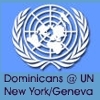

| BRIEFING - January 30, 2013 | To learn more about the Millenium Development Goals, click on the graphic Read the summer edition of the newsletter “Dominicans at the UN” (PDF) Past Briefings: December 19, 2012 December 5, 2012 November 16, 2012 October 17, 2012 September 26, 2012 September 12, 2012 August 29, 2012 July 11, 2012 May 30, 2012 May 16, 2012 April 18, 2012 April 4, 2012 March 7, 2012 |
||
Land grabbing violates human rights, impacts environment By Kati Garrison, Dominican Volunteer An emerging topic of discussion and concern amongst NGOs at the United Nations is that of land grabs. In essence, land grabbing denotes the seizure of power to control land and the resources it contains (e.g., water, minerals, forests) in order to preside over the benefits of its use. According to the Transnational Institute of Policy Studies (TNI), “[L]and grabbing is essentially control grabbing,” and the desire for capital and profit serve as the predominant motivations for the execution of such an acquisition. This hunger for power and profit results in a flagrant disregard for the inherent meaning, utilization, and management of the land that are embedded in the local community. Again, TNI sums it up best:
It is important to note that land grabbing does not constitute a new phenomenon. Countless examples of land grabbing exist throughout human history (i.e., the dispossession of land of the native peoples of North America and Australia). So what distinguishes land grabbing of the past with the contemporary acquisition of land, and why is the need for action an urgent one? Reports of large-scale land acquisitions increased dramatically over the past decade. As detailed by Oxfam, since the year 2000, these deals seized over 227 million hectares of land—an area roughly the size of the entire country of Saudi Arabia! As the world’s population and its energy and material demands increase, investors seek to secure additional lands for the production of food for export, the manufacturing of biofuels, and mining. When a company invests in land in a developing country, this act in itself does not necessarily create a problem. However, when the obtainment of land leads to ramifications such as a decrease in food production or peoples being kicked off their land, then the acquisition (frequently by means of a long-term lease) amounts to one of significant concern.
In many circumstances, land sold under the label of “unused” or “underdeveloped” in actuality serves as land for the subsistence farming of families living in conditions of poverty. These, often indigenous, families are essentially bribed with promises of employment and compensation in exchange for signing over the rights to their lands. Yet, it remains imperative to draw attention to the fact that little evidence exists of follow through on these incentives. In fact, episodes throughout history and the past decade illustrate a multitude of broken promises. In addition, current research indicates that the effects of land grabbing on communities and ecosystems amount to a profusion of negative outcomes. Extensive mining practices degrade the land and deplete natural resources such as forest cover. Damage from large-scale industrial agriculture (i.e., the utilization of fertilizers, pesticides, and intensive farming techniques) significantly deteriorates the quality of topsoil as well as causes serious damage to water sources and local ecosystems through reduction of biodiversity. Furthermore, the loss of homes, livelihoods, and the concomitant increase in food insecurity for the local peoples also incite conflict. Perhaps the most disconcerting ramification of land grabbing remains the loss of identity of indigenous peoples when they experience the loss of native lands. Often, the spirituality of aboriginal cultures exists as a powerful connection between the person and the land. As elaborated by Tania Major, an Aboriginal Australian, “ If you can imagine one family continuously occupying the same land for 40,000 years or more, using it not just to sustain life but as a place of reverence and worship, where every tree, rock and waterhole had significance, you will get some understanding of the importance of land to indigenous people.” Presently, most nations have not passed or enacted land rights laws in order to protect the most vulnerable in society from the acts of land grabbing. Thus, civil society has turned to what is termed international soft law, such as the Declaration of Human Rights. Soft law covers international declarations, resolutions, principles, guidelines and etcetera. However, this law is not legally binding—it remains only socially binding if civil society and other actors refuse to remain silent on issues such as land grabbing. On May 11, 2012, the FAO Committee on World Food Security (CFS) endorsed a set of guidelines aimed to assist governments in the endeavor to safeguard the rights of people to own or access land. “The Voluntary Guidelines on the Responsible Governance of Tenure of Land, Fisheries, and Forests in the Context of National Food Security” evolved from an inclusive consultation process, and should be utilized by civil society as a tool to promote sustainable investment and regulation of the occurrence of land grabbing. NGOs need to utilize this framework in order to shape the facilitation of a close link between local communities and both national and international institutions. For more information on land grabbing and ways that you can make a difference, visit http://www.oxfam.org/en/grow/land.
|
Dominican Leadership Conference
Building relationships and collaborating in the mission of preaching the Gospel
29000 West Eleven Mile Road
Farmington Hills MI 48336
248-536-3234 Contact: Executive Director

